The SSD Anthology: Understanding SSDs and New Drives from OCZ
by Anand Lal Shimpi on March 18, 2009 12:00 AM EST- Posted in
- Storage
PCMark Vantage
Next up is PCMark Vantage, another system-wide performance suite. For those of you who aren’t familiar with PCMark Vantage, it ends up being the most real-world-like hard drive test I can come up with. It runs things like application launches, file searches, web browsing, contacts searching, video playback, photo editing and other completely mundane but real-world tasks. I’ve described the benchmark in great detail before but if you’d like to read up on what it does in particular, take a look at Futuremark’s whitepaper on the benchmark; it’s not perfect, but it’s good enough to be a member of a comprehensive storage benchmark suite. Any performance impacts here would most likely be reflected in the real world.
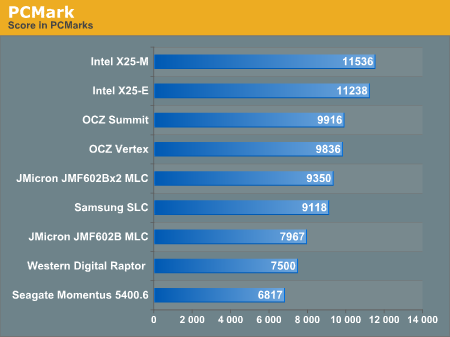
If you've paid attention to the synthetic tests from the previous pages, the results here should make sense. The Intel drives take the top two spots followed by the two OCZ drives, then the JMicron and conventional HDDs take up the rear.
While PCMark does do a great job of measuring disk performance, it doesn't seem to stress random write performance as much, allowing the JMicron drives to relax a bit.
Now let's look at the individual test suites:
The memories suite includes a test involving importing pictures into Windows Photo Gallery and editing them, a fairly benign task that easily falls into the category of being very influenced by disk performance.
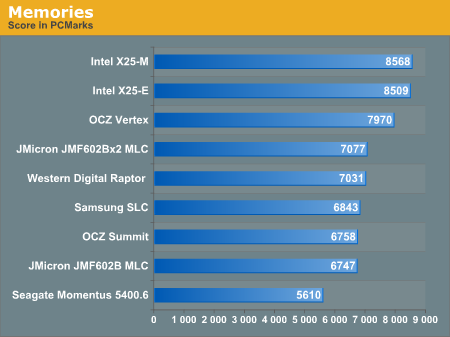
The TV and Movies tests focus on on video transcoding which is mostly CPU bound, but one of the tests involves Windows Media Center which tends to be disk bound.
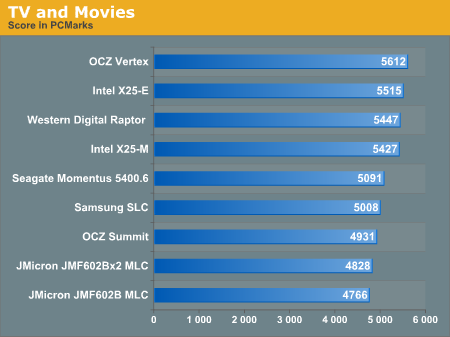
SSDs won't always dominate and in many cases they won't offer tangible improvements over a fast hard drive.
The gaming tests are very well suited to SSDs since they spend a good portion of their time focusing on reading textures and loading level data. All of the SSDs dominate here, but as you'll see later on in my gaming tests the benefits of an SSD really vary depending on the game. Take these results as a best case scenario of what can happen, not the norm.
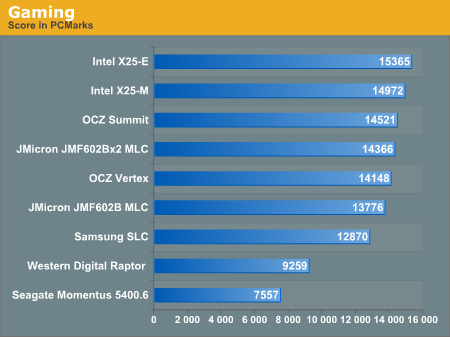
In the Music suite the main test is a multitasking scenario: the test simulates surfing the web in IE7, transcoding an audio file and adding music to Windows Media Player (the most disk intensive portion of the test).
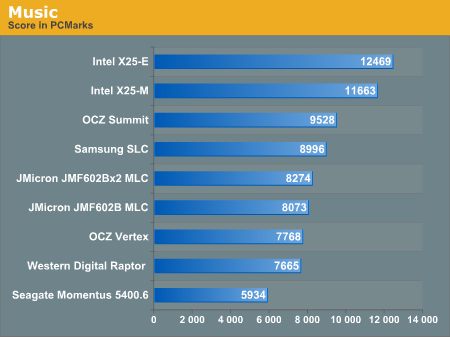
The Communications suite is made up of two tests, both involving light multitasking. The first test simulates data encryption/decryption while running message rules in Windows Mail. The second test simulates web surfing (including opening/closing tabs) in IE7, data decryption and running Windows Defender.

I love PCMark's Productivity test; in this test there are four tasks going on at once, searching through Windows contacts, searching through Windows Mail, browsing multiple webpages in IE7 and loading applications. This is as real world of a scenario as you get and it happens to be representative of one of the most frustrating HDD usage models - trying to do multiple things at once. There's nothing more annoying than trying to launch a simple application while you're doing other things in the background and have the load take seemingly forever.
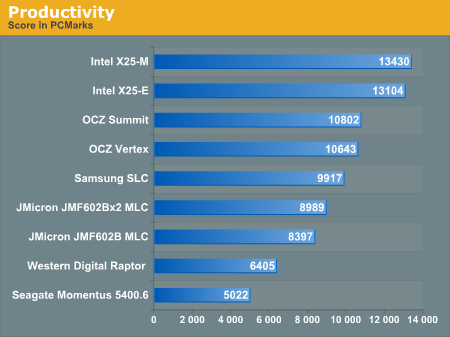
The results here are the best characterization of my personal experience with the drives. The Intel drives are the fastest, a good 25% faster than the Summit or Vertex. Next up are the OCZ drives, with the Vertex dangerously close to the Summit. The older Samsung SLC is next in the standings, followed by the JMicron drives. There's a healthy combination of reads and writes going on here which benefits all of the SSDs, including the less desirable ones.
The final PCMark Vantage suite is HDD specific and this is where you'll see the biggest differences between the drives:
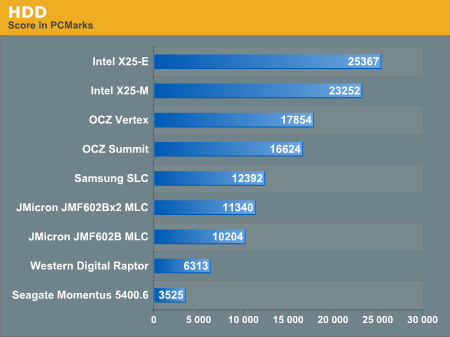
Again we're seeing the sort of breakdown we'd expect. The Intel drives come out ahead, while the Vertex is the best bang for your buck.










250 Comments
View All Comments
Natfly - Wednesday, March 18, 2009 - link
DangerMouse4269 - Tuesday, April 13, 2010 - link
Nicely written. Even a very out of practice Comp Eng understood that.geekforhire - Monday, June 14, 2010 - link
I have just replaced the hard drive in this 3 year old Dell Inspiron 9400 notebook computer with a new and very quick OCZ SSD, manually configured the partition with a 1024 offset, freshly installed the OS, freshly downloaded all of the latest and greatest drivers from Dell, and applied all currently available OS updates from Msft.The problem is that when the machine resumes from Standby, it will /reliably/ (4 out of 4 attempts) produce a BSOD 0xF4 after the power button is pressed to resume the machine from standby.
Here's the sequence to recreate the problem:
0) Machine is booted normally into Windows, and log in to an account which has administrative privs.
1) Click on Start -> Shut Down -> Standby.
2) See display turn black, disk I/O light flashes then stops, then the power indicator light begins to flash on and off slowly.
3) Wait until the power light has made 2 slow flashes.
4) Press the power button.
5) See the Dell Bios splash screen, then disappear
6) Boom: See the BSOD 0xF4
The values reported after the STOP are:
(0x00000003, 0x865b3020, 0x865b3194, 0x805d2954)
Note that I've been in contact with OCZ before about this SSD+computer, because the previous BSOD that was produced was 0x77. Their recommendation was to create the partition with an offset with a 64 interval, and to reflash the SSD with their modern firmware. This was done, the OS was reinstalled as described, and now I'm getting a different BSOD code. Another mention was a question whether the notebook computer uses a SATA2 controller (definitely compatible) or SATA1 (which may have troubles).
I've run Spinrite on the SSD, and there are lots of ECC errors being reported. I've been in contact with Spinrite, and they chalk this up to the SSD being chatty (which they like), but since SSD's are new and magnetic disks are common, they want to stay focussed on magnetic disks.
When the machine boots back up, the OS reports that a serious error has occurred, and asks that a problem report be submitted, which I do. Then an attractive but somewhat generic page is displayed with common causes (Aging or failing hard disks, large file transfers from secondary media to local hd, loss of power to a hard drive, hard disk intensive processes (eg: antivirus scanners), recently installed hardware that might have compatibility and performance problems)
Has anyone else encountered this kind of problem, and do you have any suggestions?
angavar - Thursday, September 9, 2010 - link
As a medical student I can appreciate a well researched and analytical article when I see it. This is by far the best computer hardware review I have ever read! Thank-you for your time and effort in producing what is clearly a thoroughly researched and detailed analysis.mac021 - Wednesday, October 17, 2012 - link
Thank you for the lesson and helping me understand SSD drives. May I just ask for your advice...For everyday use designing and generating prototypes for websites and running typical office s/w like word and excel for long documentations while listening to music or just having some video play in the background, then the occasional gaming of, say Star Craft 2 and Dead Space 3, and lets assume I do this on a 5 hours a day average for 365 days in a year, how long before I need to replace an OCZ Vertex/Summit SSD? And does format/reinstall help in prolonging the life of an SSD just as it does for my old hard drives (from a computer that's 6 years old and counting)? Or there's no stopping the SSD's death after reaching 10,000 times of being erased and rewritten on? I'm not one who keeps upgrading or buying new computer systems for every new thing that comes out, i'm more of a keeper and maintainer for as long as the system servers my needs... but when I make a purchase, I make sure it will be enough to last me another 6-12 years IF possible! Which is why I'm still considering SATA for my next purchase late this year or early next year (and I'm only buying a new PC just because I made a mistake buying a foxconn motherboard that can't support anything higher than XP, not even Vista... weird, anyway I found that out too late).
Also, would you know of a motherboard that supports SSD, Windows 8, Nvidea, third gen i5/i7, and up to 64GB ram?
Thanks so much!
windows10 - Wednesday, November 30, 2016 - link
This article is meaningfull, interesting. thank you for sharingsusanbones - Tuesday, September 12, 2017 - link
I was wondered to these many responses here.